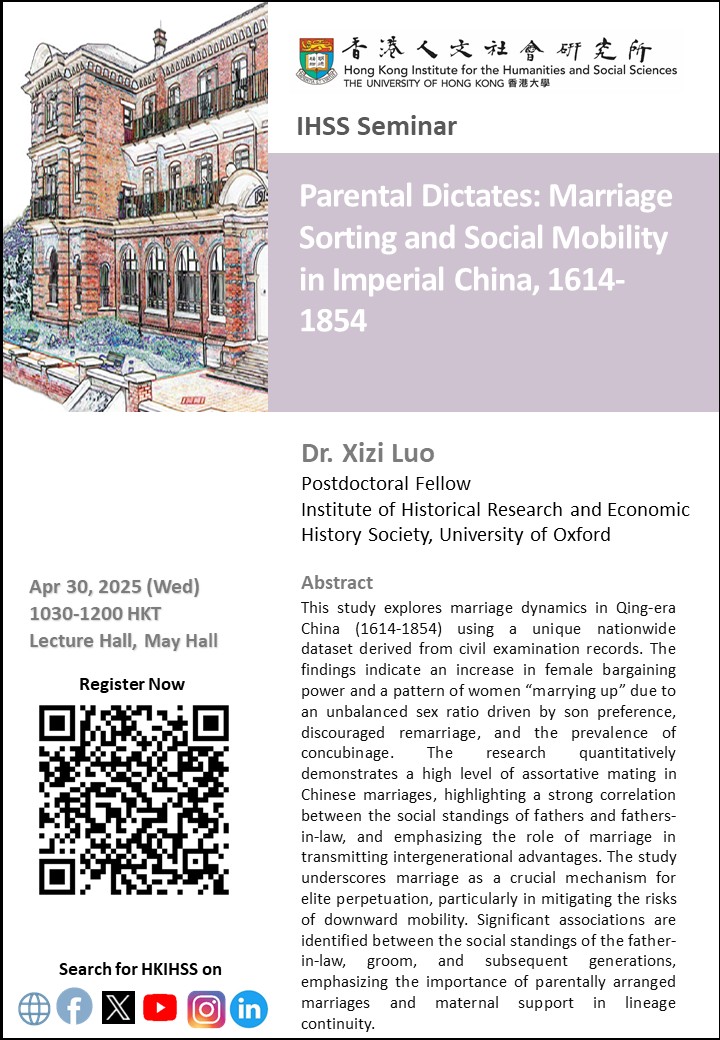- ABOUT IHSSABOUT IHSS
- PEOPLE
- NEWS & EVENTSNEWS & EVENTS
- RESEARCHRESEARCH
- FELLOWSHIPS & GRANTSFELLOWSHIPS & GRANTS
- TEACHING & LEARNINGTEACHING & LEARNING
- PUBLICATIONSPUBLICATIONS
Parental Dictates: Marriage Sorting and Social Mobility in Imperial China, 1614-1854
Dr. Xizi Luo
Postdoctoral Fellow
Institute of Historical Research and Economic History Society, University of Oxford
Date and Time: April 30, 2025 (Wed) 10:30-12:00 HKT
Venue: Lecture Hall at May Hall, HKU
Join us in person at May Hall
Parental Dictates: Marriage Sorting and Social Mobility in Imperial China, 1614-1854
Dr. Xizi Luo
Postdoctoral Fellow
Institute of Historical Research and Economic History Society, University of Oxford
Date and Time: April 30, 2025 (Wed) 10:30-12:00 HKT
Venue: Lecture Hall at May Hall, HKU
Join us in person at May Hall
Title:
Parental Dictates: Marriage Sorting and Social Mobility in Imperial China, 1614-1854
Speaker:
Dr. Xizi Luo
Postdoctoral Fellow
Institute of Historical Research and Economic History Society University of Oxford
Date/Time:
April 30, 2025 (Wed) 10:30-12:00 HKT
Venue:
Lecture Hall, G/F, May Hall, The University of Hong Kong (Map)
Language:
English
Enquiry:
Registration:
Title:
Parental Dictates: Marriage Sorting and Social Mobility in Imperial China, 1614-1854
Speaker:
Dr. Xizi Luo
Postdoctoral Fellow
Institute of Historical Research and Economic History Society, University of Oxford
Date/Time:
April 30, 2025 (Wed) 10:30-12:00 HKT
Venue:
Lecture Hall, G/F, May Hall, The University of Hong Kong (Map)
Language:
English
Enquiry:
Registration:
This study explores marriage dynamics in Qing-era China (1614-1854) using a unique nationwide dataset derived from civil examination records. The findings indicate an increase in female bargaining power and a pattern of women ”marrying up” due to an unbalanced sex ratio driven by son preference, discouraged remarriage, and the prevalence of concubinage. The research quantitatively demonstrates a high level of assortative mating in Chinese marriages, highlighting a strong correlation between the social standings of fathers and fathers-in-law, and emphasizing the role of marriage in transmitting intergenerational advantages. The study underscores marriage as a crucial mechanism for elite perpetuation, particularly in mitigating the risks of downward mobility. Significant associations are identified between the social standings of the father-in-law, groom, and subsequent generations, emphasizing the importance of parentally arranged marriages and maternal support in lineage continuity.
Xizi Luo is a scholar of economic history with broad interests in institutions, inequality, culture and ideas, political economy, and development economics. She earned her PhD in Economic History from the London School of Economics in August 2024. She is currently a Postdoctoral Fellow at the Institute of Historical Research and Economic History Society, based at the University of Oxford (2024–2025). Her doctoral dissertation explored the interaction between social mobility and institutions in shaping inequality in premodern Chinese society. Her current research investigates the long-term political and economic impact of Wang Yangming’s philosophy, contributing to interdisciplinary debates on the role of ideas in institutional and developmental trajectories.
POSTER

Copyright © 2025 Hong Kong Institute for the Humanities and Social Sciences, The University of Hong Kong. All Rights Reserved.